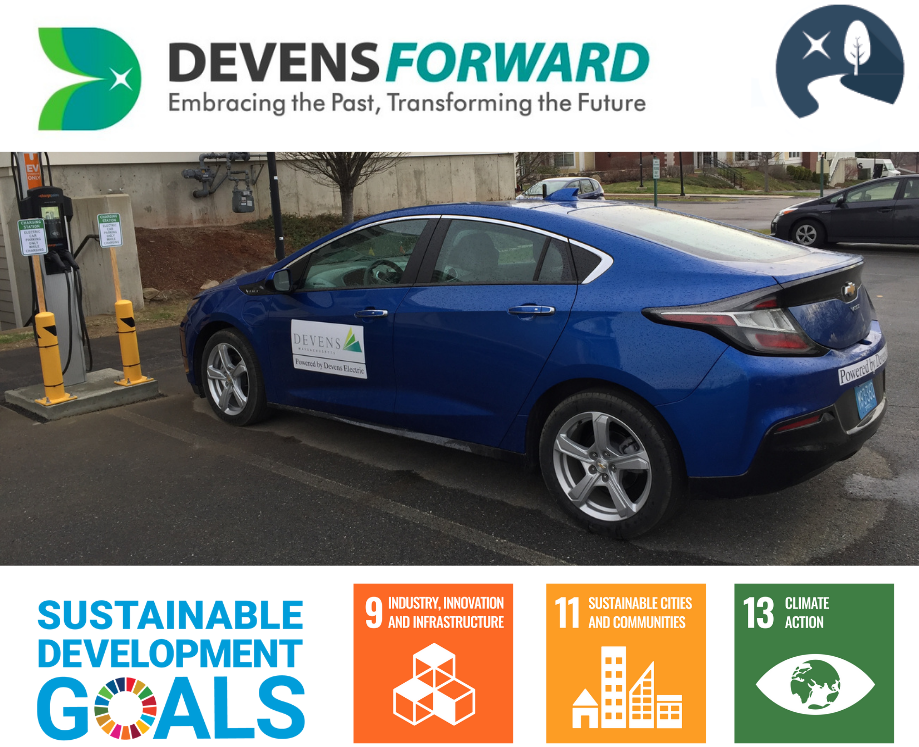The purpose of this SDG Connection blog series is to illustrate how one community, Devens, Massachusetts, has applied EF Schumacher's maxim of Thinking Globally and Acting Locally to the United Nation's SDGs. This month we are focusing on transportation and the move to electric vehicles.
Why Care About Transportation in Devens?
Greenhouse gas emissions from transportation, mainly tailpipe emissions from fossil fuel powered vehicles, contribute to climate change impacts. Despite the fact that transportation makes up a small portion of greenhouse gas emissions in Devens, multi-modal transportation is also important for reasons of community resilience, health, and safety. Reducing tailpipe emissions also reduces harmful pollutants, such as sulfur oxide (SOx), nitrogen oxides (NOx), and particulate matter, and their associated health impacts.
SDG Connection: What Local Transportation Means for Global Climate
We understand that local decisions in Devens have an impact on global climate and help us to achieve the United Nation's SDGs, including:
- SDG 9 (“build resilient infrastructure, promote inclusive and sustainable industrialization and foster innovation”)
- SDG 11 (“make cities and human settlements inclusive, safe, resilient and sustainable”
- SDG 13 (“take urgent action to combat climate change and its impacts”)
The Devens Reuse Plan calls for Devens to be a model of sustainable development. Over the last 25 years, Devens has developed as an innovation hub, the premier eco-industrial park in the United States, and a model for sustainable industrial development by utilizing the Devens Eco-Efficiency Center to work with industry to repurpose products and materials, attracting visitors from around the world.
Making the Transition to Climate-Smart Transportation in Devens
The Climate Impacts of How We Travel
Our choices of how we travel can impact the climate. Most folks in Devens (86%) choose to drive their own car or truck to work, despite our proximity to the commuter rail and the Devens Shuttle. This makes EV adoption more important. Using gasoline- or diesel-powered vehicles emit greenhouse gas (GHG) emissions that contribute to climate change. At this point in time, battery electric vehicles (EVs) are the cleanest option, especially if your utility can source its power from renewable sources.
Myth vs Fact: Debunking Common Myths about EVs
President Biden has sent clear signals that the United States needs to transition to EVs, requiring half of all new vehicles sold to be electric by 2030. The transition to EVs is here and there are common misconceptions about them to address, here are some of them:
- Myth: EVs are expensive.
Fact: Prices for EVs have fallen and will continue to fall, they may be more cost-effective over time, and there are financial incentives/rebates available. - Myth: EVs can't drive very far before their batteries die.
Fact: The range of most electric vehicles can handle day-to-day driving. DEC environmental planner Neil Angus commutes daily in his EV (a Chevy Volt) from Arlington to Devens (over 31 miles each way) where he charges during work for his return trip. - Myth: Hybrids are just as good as EVs.
Fact: While plug-in hybrids are better than gasoline-powered cars, battery electric cars have some benefits over hybrids, including reduced emissions and lower costs over time.
How is Devens Making the Connection?
The Devens Forward Plan aims to address climate change through local clean transportation solutions such as encouraging the use of public transportation. The Plan calls out the need to design and promote transportation choices that reduce GHG emissions, to develop Devens as a regional logistics hub, to become a leader in electrified freight transportation, and to create safe walkable links between housing, schools, recreation facilities, conservation areas, shops, workplaces, parking areas, and public transportation stops.
The Devens Enterprise Commission requires installation of EV charging stations near entrances of facilities (priority parking for commuters) in order to promote clean transportation options for commuters.
Businesses locating in Devens can take advantage of statewide grants and low-cost loans to build out charging infrastructure across Devens.

When Neil arrives at Devens in his Chevy Volt, he transitions to making inspections around Devens on the DEC's electric bike.
What Can Residents and Businesses do to Make an Impact?
- Go Electric: With Devens Utilities well on track to meet the goal of 50% renewably sourced power by 2030, your fuel choice matters. Residents should consider an electric, hybrid, or low emissions vehicle.
- Take Advantage of Local Resources: There are a number of free electric vehicle charging stations in Devens. Residents and businesses can take advantage of the federal tax credit and state rebates by checking out Mass Green Energy Consumers Alliance for more information.
- Engage in People Power: Choose to bike or walk to your destination for all or part of your commute to reduce traffic congestion, vehicle emissions, and improve your health at the same time.
- Take Public Transportation: Devens currently has an on-demand shuttle service that connects residents and businesses to MBTA commuter rail stations in Shirley and Ayer, as well as the communities of Fitchburg and Leominster.
- Check Out the Devens Forward Plan: Read the Devens Forward Plan if you want more information about the clean transportation transition in Devens.
- Engage in Local Events: Stay tuned for upcoming events, including Drive Electric Week taking place September 25 through October 3. Devens is also celebrating Baystate Bike Month this September and hosting a Bike Rodeo at the Devens Community Center. All ages are welcome.
The drive to electric vehicles is well underway here in Devens. The charging station located outside my office window is full most days. MassDevelopment Utilities Department has an electric vehicle, as do a number of staff here at 33 Andrews Parkway. In fact, it’s time to add an additional charging station to keep up with demand.
Previous Post
Green Team Roundtable: Redirecting Waste Streams
Next Post
Sustainable Business Spotlight: SMC

